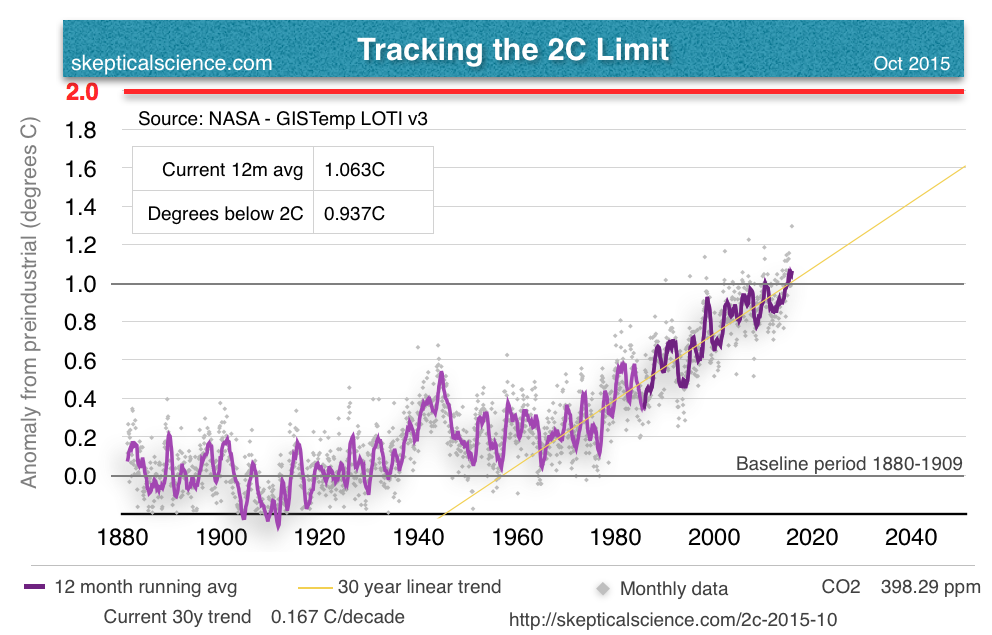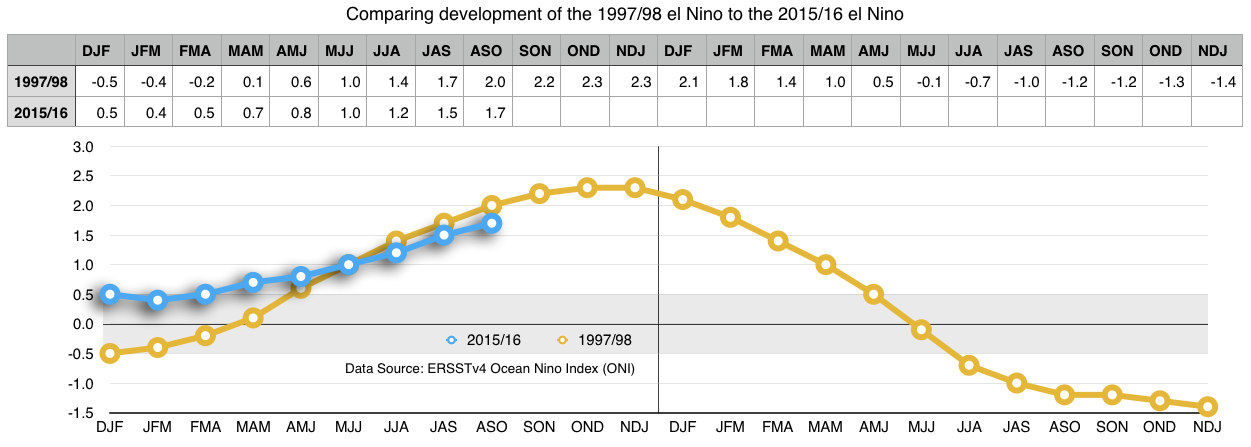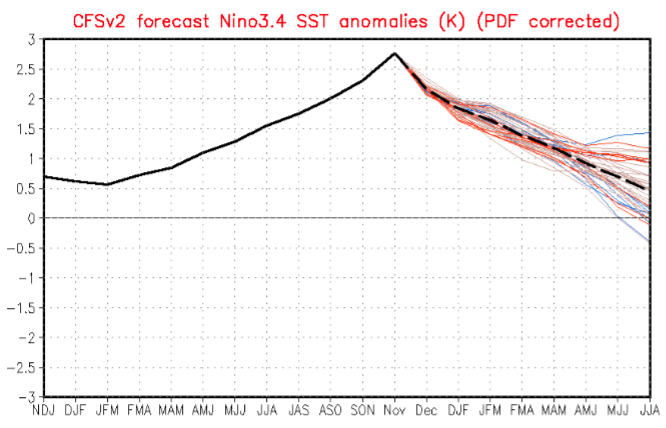Tracking the 2C Limit - October 2015
Posted on 23 November 2015 by Rob Honeycutt
This month GISS data hit a new astounding anomaly of 1.04C over their 1951-1980 baseline period. The previous record was 0.97C back in 2007. It's possible this figure may get adjusted downward slightly in coming months, but suffice to say this is a big jump in surface temperature.

Clearly this jump is by-and-large a function of the current el Nino churning away in the Pacific, but bear in mind, the surface temperature response to the el Nino is just getting started. There's generally a 4 to 6 month delay between the el Nino and surface temperature. Given that, we should continue to see sharply increasing surface temperatures through most of the early part of 2016 before things start to settle back again.
Dueling Ninos
I also recently started tracking the Ocean Nino Index (ONI) comparing the current el Nino to the 1997/98 el Nino, and here's what I got.

Note that each ONI data point is a three month average. The most recent ONI value is 1.7 but the most recent weekly Nino data hit an all-time record of 3.0. So, here again we should expect to see a continuing rise in both the ONI values and surface temperature.
Satellite Data
Once again, the satellite data isn't quite picking up the warming coming from this el Nino yet. The satellite data tends to lag the surface temperature data a bit. In the next couple of months we should expect to see a sizable jump in that data as well.
CFSv2 Forecast Model
As I've been following the current el Nino I keep noticing the CFSv2 Nino3.4 forecast model. I am not enough of an expert to say whether or not this is actually the case, but it looks broken at this point. Perhaps others will be able to comment more authoritatively than I can.

This same "V" shaped peak has been present in this model for a couple of months now.
An Aside...
Completely unrelated to the rest of this post, I just want to send out my own condolences to all the families affected by the horrendous Paris attacks. We all stand with you.
Vive la France!































 Arguments
Arguments






























The most recent weekly Nino data (released today?) hit a new all-time record of 3.1. The base line for Nino datasets was reset early in 2015, a baseline raised from the previous baseline (I think by about 0.1); this makes me think this and last weeks record values all the more significant.
From the Arctic Sea Ice Forum's Consequences/El Nino? thread: "... NOAA data show[s] that the Nino 3.4 is now +3.1, that both the Nino 1+2 and the Nino 4 increased, and the Nino 3 remained constant at +3.0." Included is a table of recent week values of the several Nino regions.
[PS] Added link
Tor B @1, the indices you reference are simple temperature indices. That is, they plot the temperature in a small area of the tropical Pacific and use that as an index of ENSO states. However, because they simply take the temperature of a small region, any increases in temperature due to global warming generates a bias towards stronger and more frequent El Nino states (and weaker and less frequent La Nina states). Given that, we do not know to what extent the record values are a consequence of a strong El Nino, and to what extent they are directly due to global warming.
One way of avoiding this problem is to use ENSO indices that either are not direct temperature measurements (the SOI) or which use a variety of different indices so that any purely global warming signal does not bias the result (the Multivariate ENSO Index or MEI). Here are the recent values of the later compared to other historically strong El Ninos:
As you can see, it is only the third strongest El Nino by the MEI since 1950. The SOI shows the current ENSO value (-20.2) as weaker than five months of the 97-98 El Nino (peak at -28.5), and six months of the 82-83 El Nino (peak at -33.3).
There is no guarantee as to how El Ninos will develop. The current El Nino may collapse and fall away towards neutral conditions, but current predictions are that it will remain strong for several more months.
If it were to do so, it will not challenge either 97/98 or 83/83 as the strongest El Nino since 1950. It is however possible that it will strengthen again. If it does so, it may follow a similar pattern to the 82-83 El Nino and end up as the strongest since 1950. Or not. If it did, that would be grim news indeed.
As it stands, the big news about this El Nino is that it so hot globally relative to 97-98 when the El Nino event is not as strong as 97-98.
To the CFSv2 Forecast Model: I also was wondering about the V shaped peak in the graph, present for a couple of months. Being not a climatologist, but understanding a bit of statistics, the repeated V-shape indicates, that for a couple of months the observed SST were far outside the plume of the model forcasts, i.e. the SST were much higher than all the models predicted. Something must be wrong with the models.
Erik